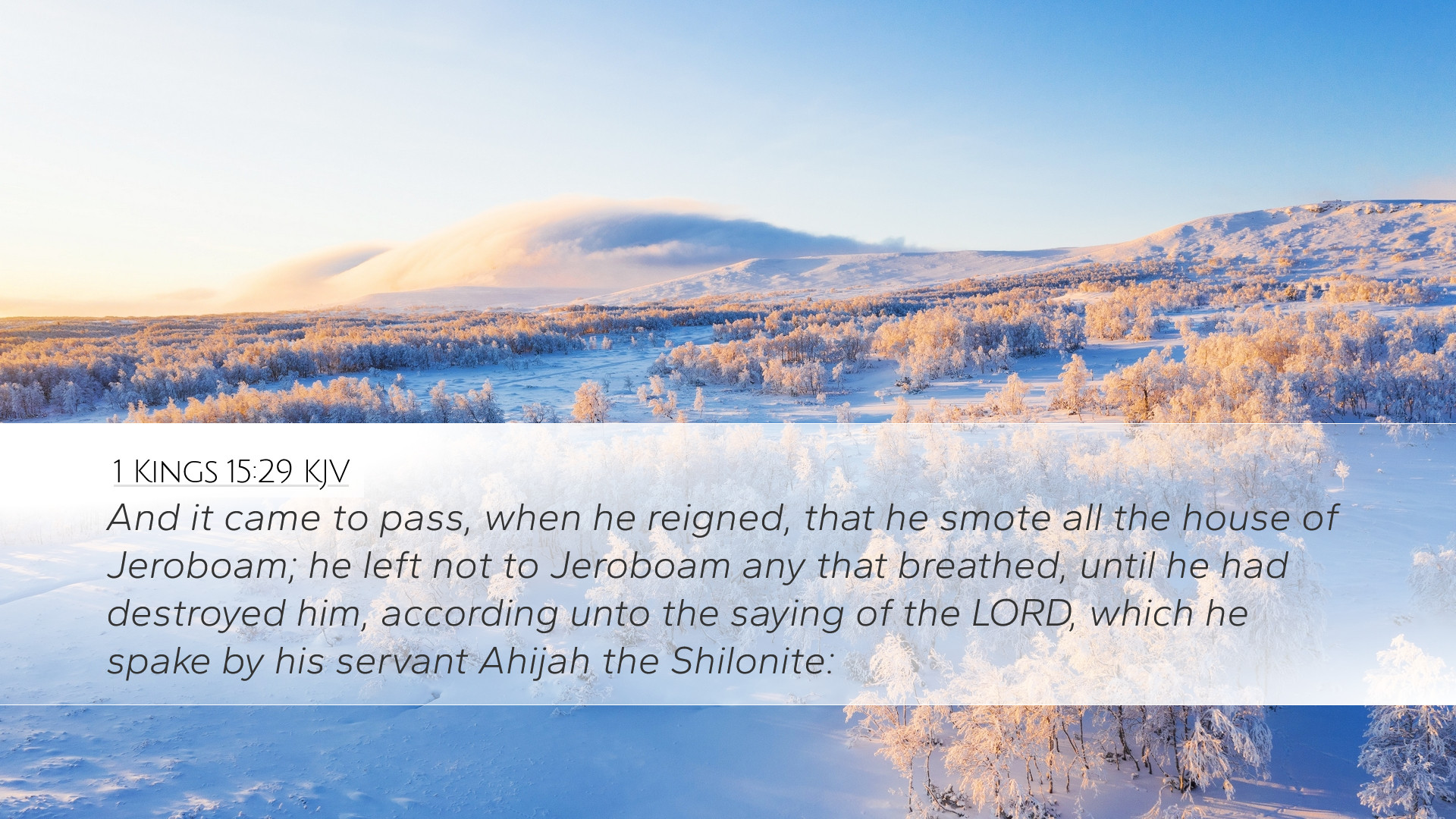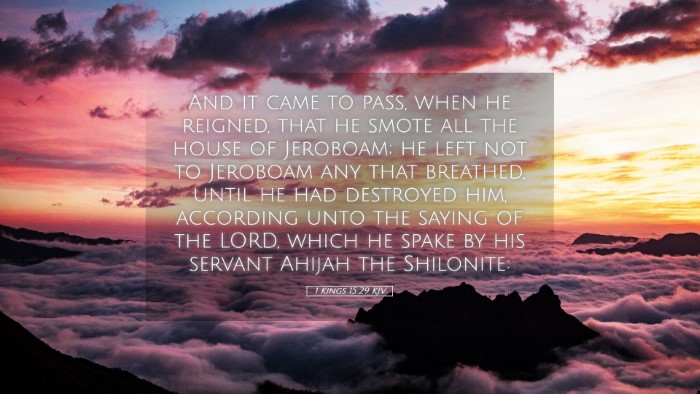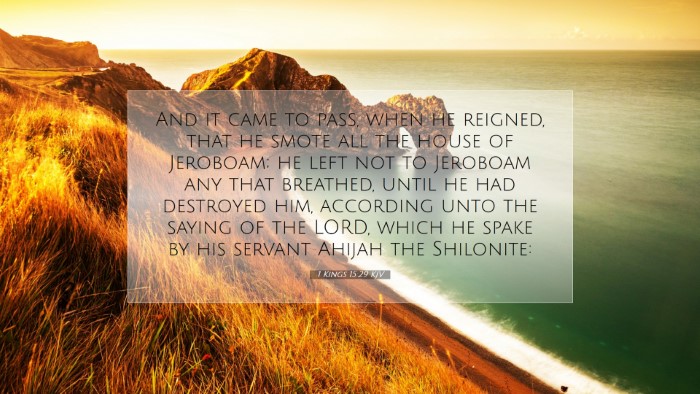Commentary on 1 Kings 15:29
Verse Text: "And it came to pass, when he reigned, that he smote all the house of Jeroboam; he left not to Jeroboam any that breathed, until he had destroyed him, according unto the saying of the LORD, which he spake by his servant Ahijah the Shilonite."
Introduction
This verse from 1 Kings provides critical insight into the reign of Baasha, king of Israel, and the fulfillment of prophetic judgment against the house of Jeroboam. The passage highlights themes of divine sovereignty, the serious nature of idolatry, and the consequences of sin. The commentaries by Matthew Henry, Albert Barnes, and Adam Clarke provide a diligent exploration of these themes, serving as a valuable resource for pastors, students, theologians, and Bible scholars alike.
Historical Context
The backdrop of 1 Kings 15:29 is steeped in the tumultuous history of Israel's division after Solomon's reign. Jeroboam, having led the northern kingdom into idolatry, faced divine judgment for his sins. Baasha's actions illustrate not only political maneuvering but also the execution of God's will as foretold by the prophet.
Divine Judgment and Fulfillment of Prophecy
Matthew Henry’s Perspective: Henry emphasizes the seriousness of God’s word. He notes that the eradication of Jeroboam’s lineage is portrayed as a fulfilling of prophecy. Jeroboam’s sin brought not just personal consequences, but was interwoven with communal judgment that Baasha executed.
Albert Barnes’ Insights: Barnes underlines that God had pronounced judgment against Jeroboam’s lineage through Ahijah, as found in 1 Kings 14:10-11. He remarks on the means by which Baasha fulfilled God’s command, acting as an instrument of divine wrath against the persistent idolatry and rebellion against Yahweh.
Adam Clarke’s Commentary: Clarke makes a notable observation about Baasha’s zeal in executing this judgment. He notes that such vigor indicates a potential for Baasha to arise from the cycle of sin that plagued Israel; however, it also serves as a chilling reminder of the extreme measures taken when covenant fidelity is violated.
Impact of Baasha’s Actions
In eradicating the house of Jeroboam, Baasha initiates a significant shift in Israel’s dynastic history. While this act is seen as fulfilling God's directive, it resonates with the broader narrative of sin's consequences and covenant loyalty. The verse indicates that the judgment against Jeroboam was complete and comprehensive.
Theological Implications
Provision of Justice: The execution of judgment against Jeroboam’s household signifies God's unrelenting justice. Both Henry and Clarke reflect on the attributes of God, specifically His holiness that fully endorses righteousness to the detriment of sin.
Inescapable Prophecy: This verse serves to underscore the belief that God’s prophecies are inevitable. As mentioned by Barnes, the prophecy by Ahijah came to pass seamlessly, highlighting God’s omnipotence in ensuring His word is accomplished.
Moral and Ethical Lessons
The destruction of Jeroboam’s household acts as a cautionary tale for leaders and nations. The commentary elucidates that moral integrity and fidelity to God’s commands are paramount in governance. Baasha’s role serves as both a model of zeal for God's judgment and a warning against the repercussions of leading others into sin.
Application for Today’s Believers
For modern readers, 1 Kings 15:29 presents profound applications:
- Covenantal Responsibility: Just as Baasha's and Jeroboam's actions had communal consequences, so too do our actions impact our communities today. Believers are called to uphold fidelity to God and encourage others in righteousness.
- The Nature of Divine Justice: Understanding that God’s judgments are not arbitrary, but are rooted in holiness, encourages believers to view sin seriously and pursue a life reflective of God's character.
- Faithfulness in Leadership: Leaders are reminded of the weight of their influence. Just as the kings of Israel were representatives of God's covenant, so should leaders today reflect His truth in their decisions and teachings.
Conclusion
1 Kings 15:29 encapsulates a moment where divine judgment, prophecy, and historical narrative intersect. Through the insights of respected commentators like Matthew Henry, Albert Barnes, and Adam Clarke, we can glean deeper understanding of God’s justice and the significance of remaining true to His covenant. This study not only enriches our comprehension of the text but also challenges our personal and communal walks of faith. The destruction of Jeroboam’s house serves as a reminder and a lesson to all who seek to follow God’s path.


